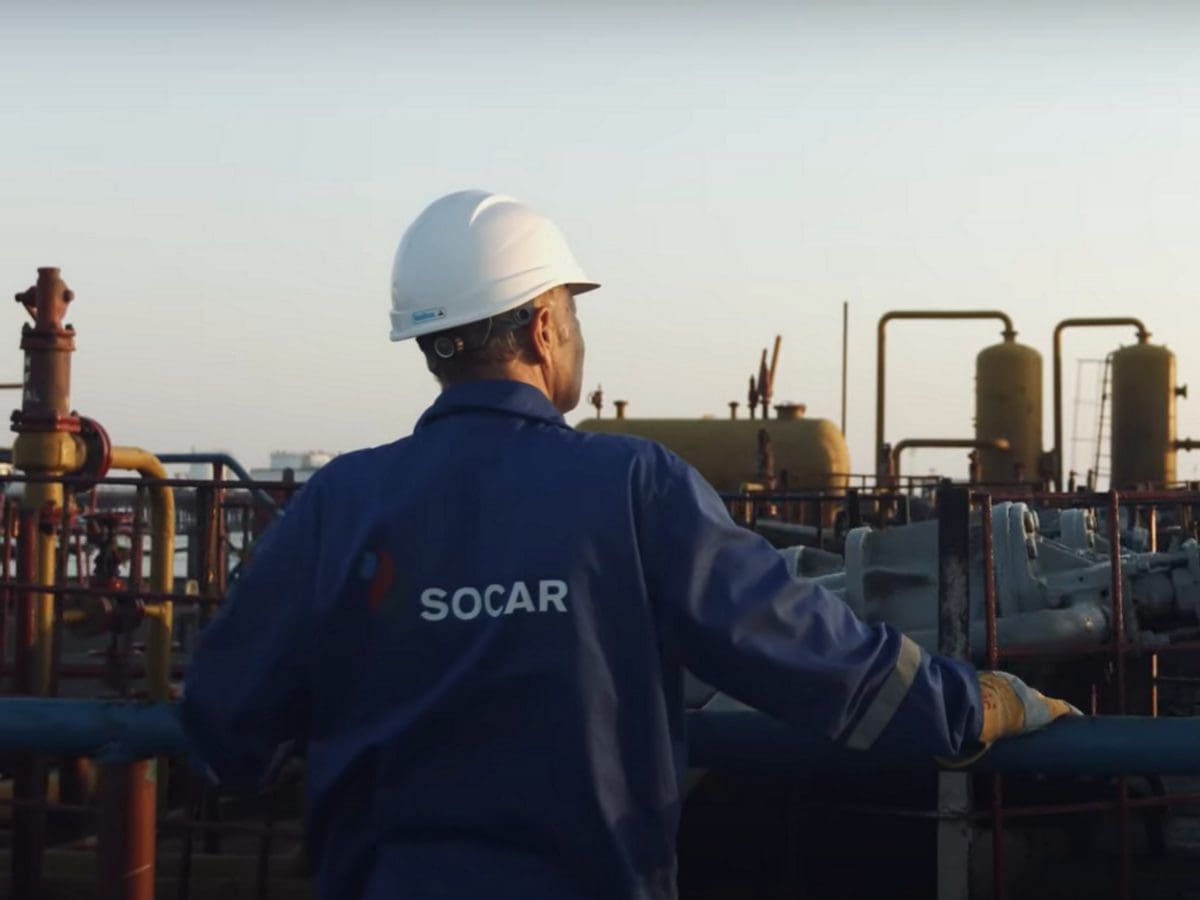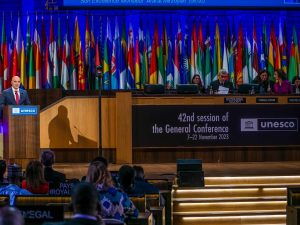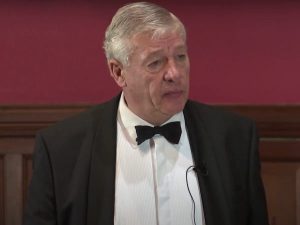Over 150 non-profit organisations have called out the influence of big oil at this year’s upcoming climate crisis negotiations in Azerbaijan. The United Nations Framework Convention on Climate Change (UNFCC) will hold the COP29 international climate summit in Baku in November.
In an open letter, a global coalition led by 350.org and Oil Change International raised their grave concerns about clear conflict of interest in the COP29 organising committee. Specifically, the coalition of groups has singled out host Azerbaijan’s choice to include its state oil company president Rovshan Najaf as a member.
COP29 host ramps up fossil fuels
Azerbaijan’s state oil company, SOCAR, plans to expand fossil fuel production. Moreover, a Global Witness analysis from January found that the country is set to ramp up gas production by a third over the next decade. This will see Azerbaijan take production from 37bn cubic metres in 2024, to 49bn cubic metres in 2033.
Overall, Global Witness estimated that fossil fuel companies would plough US $41.4bn to extract 411bn cubic metres of Azeri gas. Notably, it said that this could pay the cost of installing more than 1,170 offshore wind turbines, and emit 781m tonnes of carbon dioxide – or twice the annual emissions of the UK.
Given this, the signatories of the open letter called Azerbaijan out. It read:
Despite Azerbaijan being a party to the Paris Agreement, having endorsed the UAE consensus and accepted the findings of the IPCC, SOCAR plans to expand its fossil fuel production, which is incompatible with the objective of limiting warming to 1.5°C, and lacks a clear and credible strategy to transition away from fossil fuels.
In short, SOCAR’s plans contradict the Paris Climate Agreement – the arguable cornerstone of the COP climate negotiations.
COPs lead by compromised petrostates
Of course, it wouldn’t be the first time the summits host’s actions has run counter to climate goals. Azerbaijan follow intransigent fossil fuel devotees such as the United Arab Emirates, Egypt, and the United Kingdom to the table.
As the Canary’s Tracy Keeling reported, the UK’s COP26 welcomed 503 fossil fuel lobbyists into the fold. Now of course, the UK’s Tory-led government has abandoned even the slimmest pretence of keeping to its climate goals, and plans to increase gas production.
Likewise, Egypt escalated fossil fuel lobbyist entry into the summit, granting 636 delegates access. Again, the country has boosted fossil fuel production in recent years.
However, the UAE’s COP28 took this to new heights when it allowed 2,456 corporate fossil fuel lobbyists into the conference. Worse still, UAE national oil company Adnoc’s head sultan Al Jaber acted as the country’s COP28 president-designate. Notoriously, Al Jaber championed the role of fossil fuels, arguing they would be needed for the “forseeable future”.
The signatories to the open letter acknowledged this, stating:
We are further aware that Azerbaijan is not the first fossil fuel producing country to host a COP. At COP28. At COP28, global civil society criticized the nomination of Sultan Al Jaber as COP president in order to protect the global climate talks from the influence of the fossil fuel industry.
Now, another oil exec threatens to derail the next annual summit.
More oil execs and employees
Specifically, Azerbaijan has included SOCAR president Rovshan Najaf in the COP29 organising committee. As Climate Home News reported, the group also includes the head of state energy company Azerenergy’s Balababa Rzayev.
Initially, civil society groups additionally heavily criticised the committee for consisting of men only. After this, Azerbaijan added 12 women to the previously all-male committee.
Moreover, COP29 marks a consecutive summit putting a fossil fuel veteran at the helm of negotiations. Following in predecessor Al Jaber footsteps, former long-term state oil company employee-turned minister of ecology and natural resources Mukhtar Babayev is heading the key summit.
As such, the open letter argued that:
The inclusion of the president of the state oil company in the COP29 organizing committee presents a significant conflict of interest. The credibility of the COP29 presidency, already weakened by your historic ties to the oil and gas industry, risks being further jeopardized by this decision.
Repressive states
On top of this, the open letter further expressed deep concerns over civil society’s freedom of speech, peaceful assembly, and human rights in the COP29 host country Azerbaijan. The groups noted that:
in Azerbaijan, peaceful protests are repressed and independent organizations and media outlets face excessive restrictions in law and practice. Just last week, Azerbaijani authorities conducted raids on local media offices and detained a dozen journalists and other civil society members.
Such tactics are routinely used by the government of Azerbaijan to silence civil society, especially those who speak out about corruption and environmental harms in the oil industry – like Gubad Ibadoghlu , who has been imprisoned for over six months.
In particular, the organisations highlighted that the inclusion of two further members to the organising committee was “highly problematic” and could create a “chilling effect”. These include Ilgar Musayev, the head of the country’s Service of Special Communication and Information Security and chief of the state’s security service Ali Naghiyev.
Naturally, human rights organisations have raised similar concerns at previous COPs.
Egypt’s mass arbitrary detention of hundreds of activists in the weeks leading up to COP27 set the stage for its surveillance and suppression of civil society voices.
Then, climate justice groups highlighted the similarly autocratic UAE’s repressive protest laws and poor human rights record ahead of the negotiations in 2023.
So, for the upcoming negotiations, the open letter called for clarification of state security and the special communication and information security services’ role during COP29. Head of public engagement at 350.org Namrata Chowdhary said:
The climate movement has steadfastly held the line at climate negotiations, COP after COP after COP, pushing political leaders to drive the transformational change in climate policy we urgently need to see. But for three years in a row, these UN climate talks are hosted in countries where the interests of the fossil fuel industry are given precedence over those of people and the planet.
Worse still, they exercise their authority to deliberately exclude the voices of the people most directly impacted by climate change, and threaten our right to push for the solutions we need.
Chowdhary added that:
Inviting the heads of oil companies and the secret service onto the organising committee sends a clear signal to civil society – that we will be held at a distance, and our influence limited.
A “deep stake in seeing climate action fail”
The letter was originally signed and sent by the executive directors of 350.org, Oil Change International, Action Aid, and CIEL. Since then, organisations representing youth, environmental, human rights, and Indigenous groups from over 50 countries and six continents have signed on.
However, COP29 president-designate Mukhtar Babayev still hasn’t responded.
Global policy manager with Oil Change International Romain Ioualalen said:
The upcoming United Nations Climate Change Conference must be the COP that starts implementing a full, fast, fair, and funded transition away from fossil fuels, after the promises made in Dubai.
Yet, this will be the second COP in a row that is run by someone with deep ties to the oil and gas industry, which has a deep stake in seeing climate action fail. The recent inclusion of the President of the State Oil Company of the Republic of Azerbaijan (SOCAR) on the core COP29 team sends yet another profoundly negative signal on the potential capture of crucial climate talks by the oil and gas industry.
Additionally, Ioualalen added:
The COP29 presidency was heavily criticized for failing to ensure gender balance on its organizing committee and should therefore know that its choices will be scrutinized globally.
But, like with their correction of adding women to the committee, after introducing an all male panel earlier this year, it is not too late to separate oil company interest from the most important climate change conference of the year.
Needless to say however, the petrostate architects of climate dither and delay have shown again that they will likely bring more “blah, blah, blah” to COP29. Of course, it wouldn’t be a climate summit without it.
Feature image via EnerSol/Youtube




